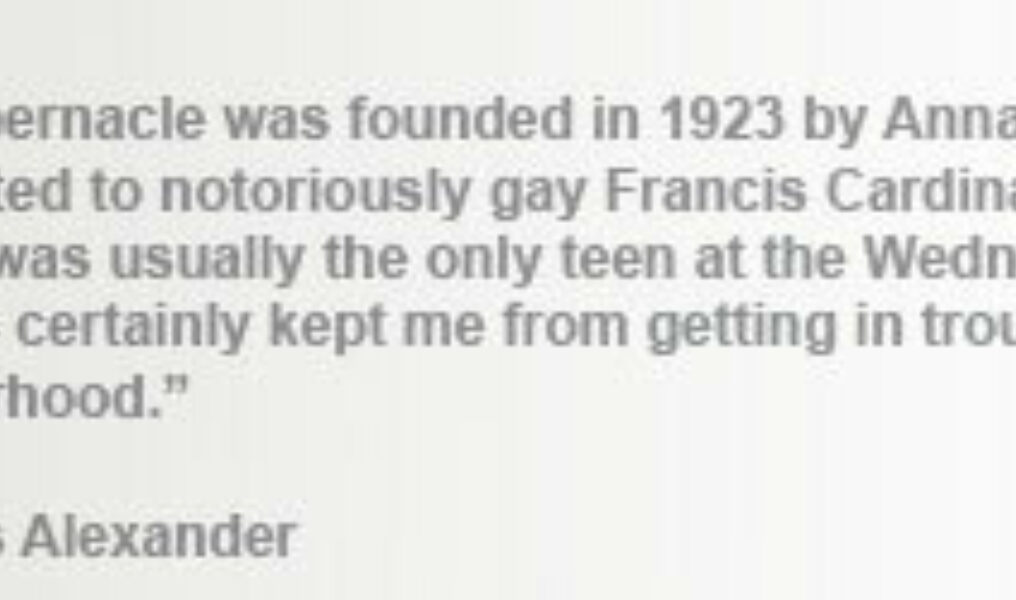
Parting Glances
Sundays my mother took me to a First Baptist Church from ages five until 12. We rode with our neighbor Mrs. Williamson, her two sons, William and Robert.
First Baptist (now Detroit's People's Community Church) was affiliated with the more liberal American Baptist Convention, in contrast to the fundamentalist Southern Baptists, soon to vote on a name change.
At 12 ("the age of accountability") I was eligible for church membership through the rite of total-immersion baptism. I took this step seriously, even though I peeked with some interest at the other boys who, naked, were putting on full-length baptismal robes for baptism.
I was also somehow aware that Dr. Cyril Baker, organist and choir director, had girlish mannerisms. But his selection of music was impeccable and contributed at some level to my appreciation of good church and choir music.
Following my baptism I was given a Holy Bible, in which Pastor Rev. Ernest L. Honts wrote, "To Charles Robert: May you always be a good monk." To this day I don't know what he meant exactly. (Surely, not celibacy!)
My mother insisted I go to Baptist Camp. I was eager to get away that summer. It would be my first time away from home on my own. I took along my baptismal Bible for good luck and verse-learning reference.
I did everything expected of a Christian camper. I prayed, read scripture, wrote poetry ("A day at camp is a happy one."), swam, canoed, played baseball, got brown as the proverbial berry. I also developed an attachment – actually a crush – on my camp counselor, Jerry. I hated to leave him.
I stopped going to First Baptist shortly thereafter, probably because Mrs. Williamson moved and there was no one to drive us to service. By the time I turned 15 I found a friendly neighborhood church: The Missionary Workers Tabernacle (Interdenominational). I attended faithfully three times a week.
Unusual for the mid-1950s, the Tabernacle was run by women who, despite the biblical admonition "suffer not a woman to speak in church," felt the call to preach the gospel. They played banjos, guitars, trumpets, mandolins, tambourine, sang and actively saved souls on street corners.
The Tabernacle was founded in 1923 by Anna Curry Spellman, who was related to notoriously gay Francis Cardinal Spellman. Attending there – I was usually the only teen at the Wednesday Night Testimonial Service – certainly kept me from getting in trouble in a very rough neighborhood.
A few things puzzled me. I speculated about what sort of sins regularly drove Brother Townsend to the altar to confess. I also felt it was somewhat unChristian for Sister Norton to say that "Blacks should attend their own churches. Races shouldn't mix."
Most disturbing was the sad plight of one of the younger Missionary Workers, blond-braided Sister Anderson, who I recall one Sunday service being completely distraught, sobbing uncontrollably. Her brother had died unexpectedly. "Unsaved!" And was now surely suffering torments of Hell.
Growing aware of my own physical needs, trying through prayer, will power, determination, to ignore them – with less and less success – I wondered if I too would be lost forever in an eternity without my beloved Jesus?










